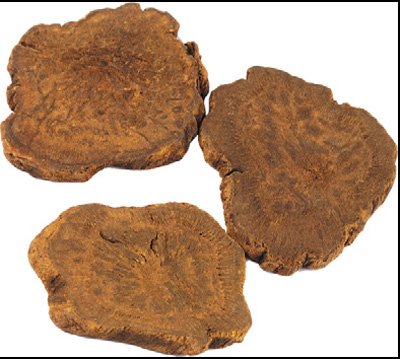Rhubarb
Ayurvedic Medicine

Rhubarb
Rhubarb root (E), Revand chini (H):
Growing in the Himalayas, this powerful laxative is an invaluable herbal remedy for intestinal congestion, bleeding and blood toxicity.
Digestion Rhubarb root has an affinity for purisavahasrotas and is used in both constipation and diarrhoea; its action is dosedependent. The anthroquinones purge the bowel while the tannins astringe and maintain its tone. As a laxative it takes about 8 hours to work and should be combined with antispasmodic herbs to prevent griping. Beneficial in clearing the high pitta and kapha that manifests in dysentery and other damp-heat symptoms with blood and mucus in the stool. Used in postfever constipation to clear ama. Also used to clear abdominal swelling. Liver Its affinity for rakta dhatu and bitter flavour make it a useful cholagogue. It can be used in acute hepatitis and cirrhosis with heat and liver congestion. It may be useful as part of a programme that purges small (<0.5mm) gallstones from the gall bladder. Do this only under the guidance of a qualified herbalist. Cholesterol Reduces cholesterol (LDL) and it is also used to treat obesity. Gynaecology Clears adhesions and clots in pitta–kapha problems; endometriosis, fibroids and dysmenorrhoea. Also used in vaginal infections and STDs. Mucous membranes Its tropism for rasa dhatu make it a specific for mouth ulcers and ulceration of the whole GIT (anti- Helicobacter pylori) with pitta signs. Bleeding Stops bleeding from heat in rakta pitta conditions; haemorrhoids, ulcers, haematuria, melaena. Cancer Useful adjunct to treatment to clear tumours, ama and to remove toxins from the bowel.
 Tila
Tila Aloe
Aloe Sarpagandha
Sarpagandha Pit Shirisha
Pit Shirisha Kanchanara
Kanchanara Bilva
Bilva Devadaru
Devadaru Tulsi
Tulsi Cumin
Cumin Dhattura
Dhattura Vacha
Vacha Chiretta
Chiretta Test your English Language
Test your English Language  Xmas Party Games
Xmas Party Games New Year Wishes
New Year Wishes Precautions while using Refrigerators
Precautions while using Refrigerators Benefits of Oregano
Benefits of Oregano Atal Bihari Vajpayee
Atal Bihari Vajpayee Best Cities for young People
Best Cities for young People Best Cricketer
Best Cricketer




